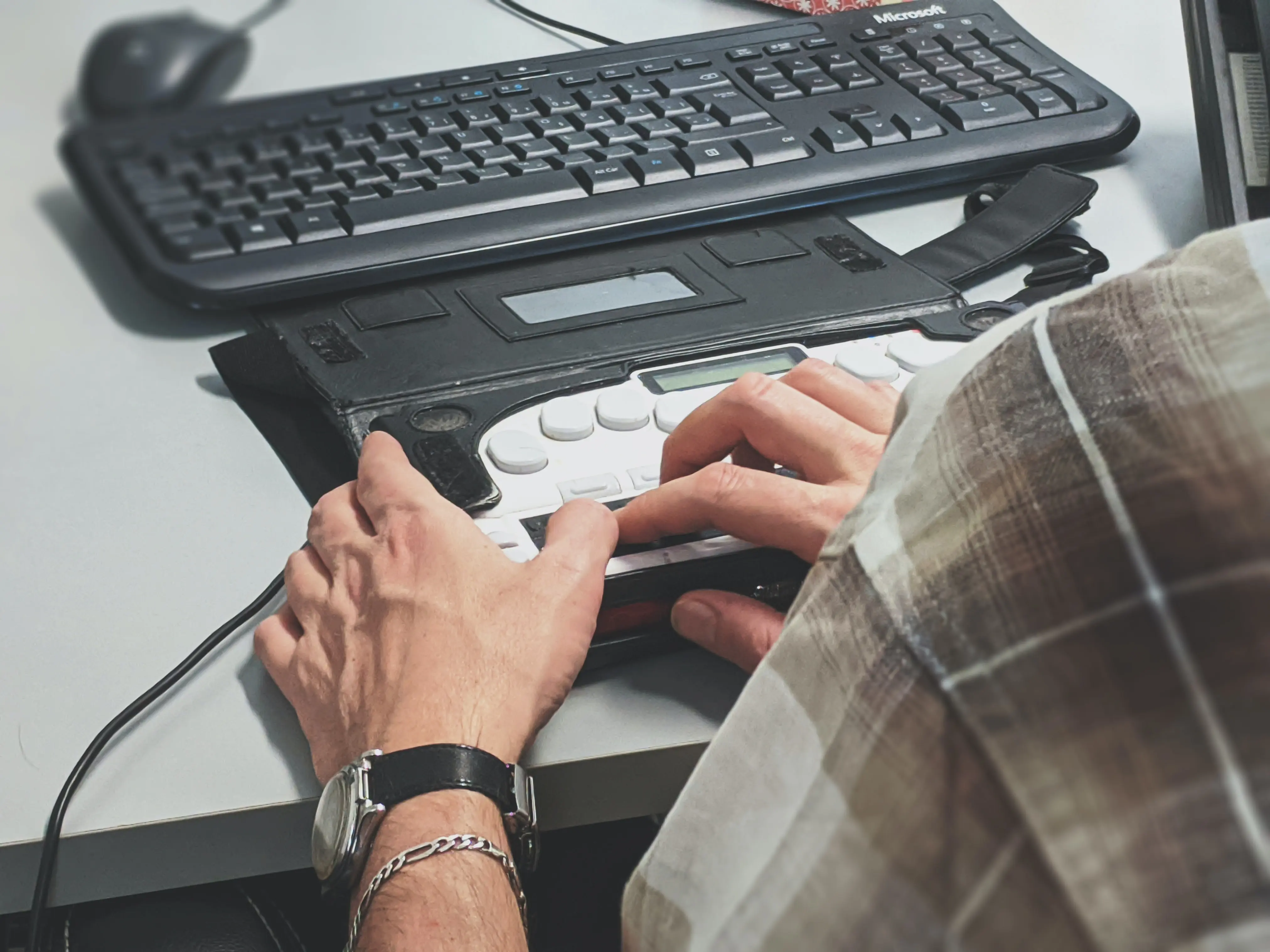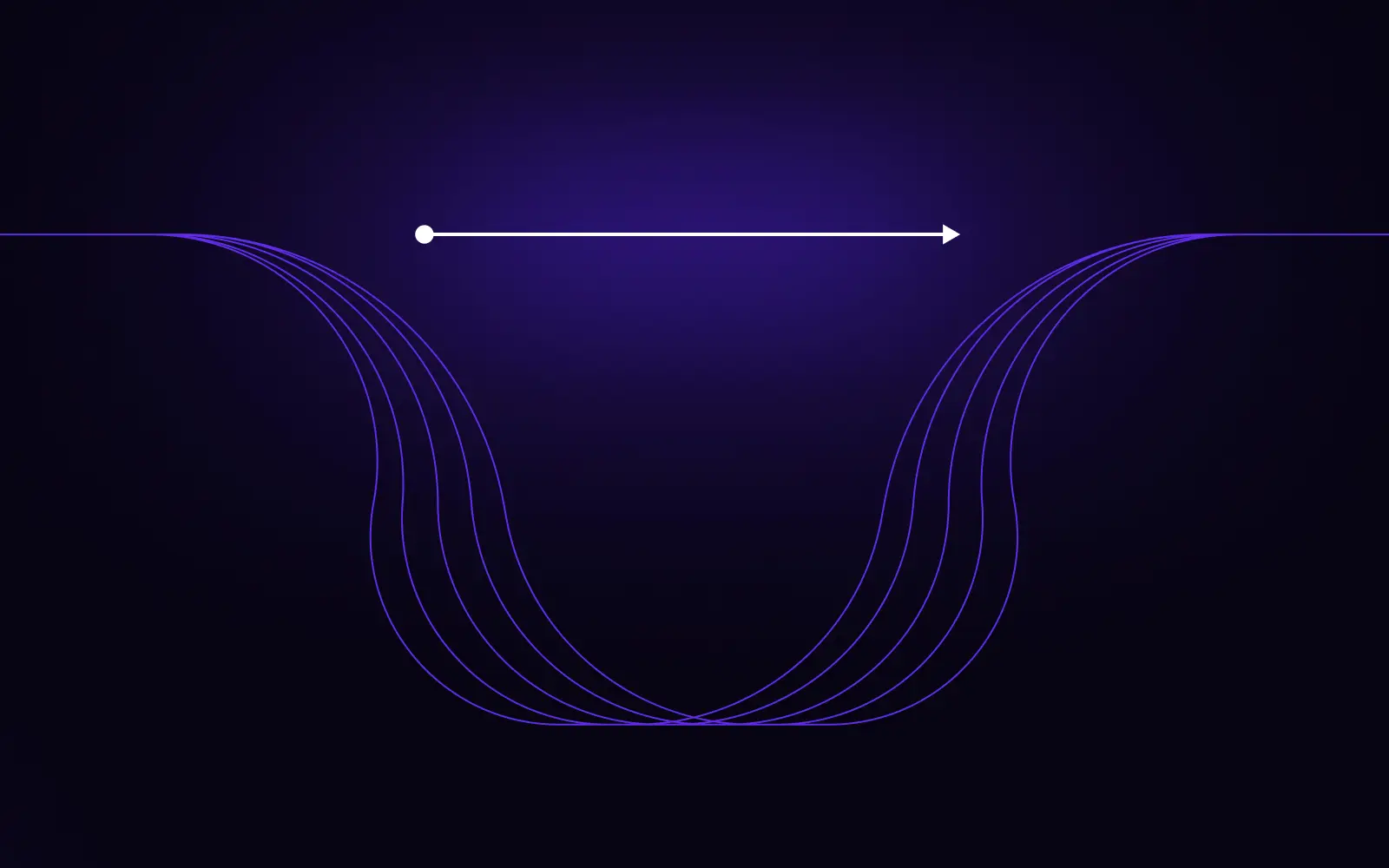
Maciej Machniewski is a Social Media Specialist working at WarsawJS. He is also a person living with a disability of the first degree: he suffers from spinal muscular atrophy. When he heard about the CodeAbility hackathon, he himself suggested a conversation that could explain to the participants of the event what accessing the job market is like for people with disabilities. First of all, Maciej is a person with an infectious positive energy. Although the subject of this interview is serious, Maciej does not take himself too seriously and has laughed with me throughout our conversation. He convinced me that the needs of people with disabilities do not differ from the needs of all other employees. What he is counting on most is a change in employers' attitudes and generally greater awareness of the benefits of employing people with disabilities.
Kasia: Hi Maciek. You work as a Social Media Specialist supporting the WarsawJS organization. How did you land this job?
Maciek: You could say I got here by accident. Almost two years ago I quit my job at my previous company and started looking for something new. As you know, people with disabilities don’t have it easy in this regard and it took me a good few months to find something. Then I had the idea that I would write a post on my Facebook that I am looking for a job and ask my contacts to share it. I expected to get a dozen or so shares and that would be the end of it, but I was amazed to see that I got more than 20,000 shares and lots of comments. There was a time when I did nothing else all day, just replied to messages. People either offered me a job or wrote that it was cool that I was doing something like that.
I had the idea that I would write a post on my Facebook that I am looking for a job and ask my contacts to share it. I expected to get a dozen or so shares and that would be the end of it, but I was amazed to see that I got more than 20,000 shares and lots of comments.
In fact, I was about to sign a contract with a certain company, but then it hit me that this probably wasn’t the right place for me after all. The company had changed the terms of the employment agreement at the last minute, so I thanked them and decided to withdraw from the process. Some days later Piotrek Zientara got in touch with me. He said he would really like to help me, and that they are looking for someone to run their social media. In fact, I was convinced it was the right job for me right away, because Piotrek is a very cheerful and open person. It was obvious that he wanted to give me this job and even when I told him I needed to ask for some requirements, it was never a problem for him. For example, he wanted to offer me a full-time job, and I only wanted to work part-time and he said he would be happy to accommodate that. This is how my adventure with WarsawJS began.
Kasia: Was it your first job in the IT sector or did you work in it before?
Maciek: It was my first job in IT. Earlier, I wrote a little about motorcycle racing. Then I wrote a blog for a social organisation that specialised in mediation, which is something completely different again.
Earlier I talked about a job that I had almost accepted and that was also in IT. That company discouraged me a bit - all I heard was, “you know, this is the IT sector, it’s quite specific - you need to be suited to it”. In WarsawJS, everyone was open and willing to cooperate, and most importantly - they encouraged me.
Kasia: What does your work involve?
Maciek: I mainly run Warsaw.JS’s social media. I make sure that all our events, meetups and workshops are well promoted. I also ensure that everyone knows when each event will happen, what it will look like, what lectures will take place and on what topics. The idea is to get as many people to participate as possible. I also need to know graphics a bit - which was something completely new to me, but I got a lot of help from Piotrek. WarsawJS has always used Figma, a graphics program. Piotrek bought me access, I studied how to use it and can now independently create some basic banners and graphics. I also do interviews from time to time - there are not many of them yet, because sometimes there is a little time for all of this, but I have had three interviews so far, now I'm working on another one. It is also a kind of springboard and also something new and interesting.

Kasia: As you know, the CodeAbility hackathon will take place soon, the aim of which is to create products that support people with disabilities to access careers in IT. I am looking for some inspiration for the participants so that they can propose cool tools which will make a tangible difference. It seems to me that the job search itself must be difficult for people with disabilities, because the recruitment process is often very rigid and tailored only to the needs of the majority. It seems to us that your situation was no different from others - you applied just like everyone else - but as you said yourself, this method did not work. That's why I wonder how has living with a disability influenced your job search?
Maciek: Well, there is a difference. As you say, like everyone else, I was able to apply just like everyone else, but there really wasn't much feedback. Of course, I will not speak on behalf of all people with disabilities, I can only tell you my own story. I don't get the job done as fast as everyone else and I have never hidden it. My bosses also knew about it, whether it was Piotrek or previous bosses - they never saw a problem in it. For them, the most important thing was to do what had to be done effectively and on time, and whether I do it in an hour or three, it doesn't matter.
You need to change the attitudes of different people, and make them aware of the benefits of employing people with disabilities.
It seems to me that a lot of people do not understand this, they would like disabled people to do everything a healthy person does, just as quickly and just as well. I think the biggest problem lies in their attitude. Maybe this will sound bad in the context of a hackathon. Maybe you do not need an application so much, but maybe you need to change the attitudes of different people, and make them aware of the benefits of employing people with disabilities. Few people know that the employer does not have to cover the entire remuneration for people with disabilities, and these are also the benefits of such employment. But you have to know this, you have to be open to it.
Kasia: Exactly, one aspect is definitely lack of information, but on the other hand, there are many people who, for various reasons, need to have specific adjustments made to their workplace. From your perspective, is it easy to look for employers who are able to provide the conditions you need?
Maciek: I don't have big expectations because I really have everything I need to be able to work. For me all that’s required is a computer and the right software. As mentioned before, I think what’s really needed is greater understanding for employees with disabilities. I’m aware that some of them may need special equipment which the employer would have to source. I was lucky to have it all, and was frequently asked by Piotrek if I needed anything.
It's hard to find an employer who is open to making the necessary adjustments. It’s difficult to know how to start the search.
Coming back to the question, because it ran away a bit from me (laughs), it's hard to find an employer who is open to making the necessary adjustments. It’s difficult to know how to start the search. Maybe this is an idea: creating an app that will connect companies or people who are open to working with people with disabilities, and who are familiar with this topic, so that when starting the job search, candidates would know where to go.
Kasia: Exactly, because openness is one thing, but sometimes there are physical conditions that have to be met, because if someone wants to work from an office, you may need to adjust the entrance to the building.
You talked a bit about your experience at WarsawJS, but I wonder what onboarding looked like for you? I have the impression that in WarsawJS it was very smooth from the first conversation to working together. What had it been like before?
Maciek: Every job I had was completely different. In my previous job, my onboarding consisted of just seeing my boss once. He came to sign a contract and then just told me what to do, what articles to write and that was basically it. Also, I ended up having very little contact with him or the other employees.
In WarsawJS it was always completely different, much better. I had contact with everyone, with every boss and volunteer. I could always consult anyone. At the beginning, Piotrek Zientara and Piotrek Kowalski introduced me to it and they were always open. I didn't have to ask for anything, they were eager to show me what I needed. It was so natural. I guess it should always be like this. There are tools that really facilitate better cooperation, including Slack, and Google Meets.
Kasia: During the CodeAbility hackathon, we are also looking for solutions that allow for effective upskilling of candidates with disabilities. You have chosen a field of work in which change is probably the only constant - Social Media itself certainly changes very dynamically. Yesterday, when we arranged an interview, you said you were taking part in a course. So I wonder how you look after your continuous professional development?
Maciek: The course is not actually related to social media. I'm learning Javascript. Piotrek Zientara always wanted to "infect" me with his love of Javascript and I believe that is his number one goal in life (laughs). I laugh, but I always wanted me to get a flavour of programming. Also Piotrek found me a friend with whom I could work. Tomek has been teaching me Javascript, for two months now. I am slowly beginning to pick it up!
As far as social media is concerned, it is so good that there is so much information out there which you just need to search for. You just need to make sure that you have access to the best sources and find some truly valuable nuggets.
Kasia: If you could give one piece of advice to the participants of the hackathon that would help them come up with a product that would really have a chance to appear on the market, what would it be?
Maciek: This is a good question (laughs) and I don't know if I will be able to answer unequivocally. It seems to me that everyone should be able to use it in the first place. For example, people who have poor eyesight will find it useful to be able to change the font size. It is also important that it is intuitive.
Kasia: And if an event participant wanted to consult potential users of the product, where do you think they should turn?
Maciek: I would probably look on Facebook, in groups. For example, there is a group for people with muscle wasting illnesses. Its members are open, you can write, give an idea. Many people will be happy to test it, say what’s good about it and what can be improved.
Kasia: Can you share any more inspiration for CodeAbility participants?
Maciek: I am interested in games and for some time I have been observing that games are moving forward to enable as many people as possible to play them. A few months ago, the game "The Last of Us II" was released, prepared in such a way that even people who cannot see it can play it and enjoy it.
Kasia: is it worth getting inspiration from the gaming industry?
Maciek: Yes! I remember reading about all the facilities that were added to this game, including a video where a blind person could set everything up with the help of an audio tool and could enjoy the game. She cried with joy! This game achieved something great and it’s worth taking inspiration from that.



